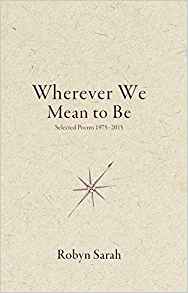Book Review
 Part of the pleasure of reading this collection is that it feels outside of the poetry trends that come and go from year to year. These are poems that have a craft, that feel refreshingly unacademic; they have a sense of being carved out of something like wood so that the action, the movement—especially in the poems that ground themselves in sun, rain, moon, stars, etc.—feel both as fresh and as eternal as the subject matter on which they focus.
Part of the pleasure of reading this collection is that it feels outside of the poetry trends that come and go from year to year. These are poems that have a craft, that feel refreshingly unacademic; they have a sense of being carved out of something like wood so that the action, the movement—especially in the poems that ground themselves in sun, rain, moon, stars, etc.—feel both as fresh and as eternal as the subject matter on which they focus.
Robyn Sarah can—in a less explicit, safer way than, say, a poet like Sharon Olds—portray the psychosexual workings of a relationship. And she does so through the domestic craftiness of a long-term home building application of imagery. In a poem like “Interim,” for instance, communication is in jeopardy following some good, old-fashioned, marital bickering. The post-argument tension between the two is presented through a Heaney-like scaffold structure, in which one partner is on a different level than another, and must decide on whether to reach out or retract. And there’s a beautiful unawareness—the kind of unawareness you want in this type of poem—to the closing lines, whose self-made contraption balances in its own tensions built up in the previous stanza:
I’ll stay here and make patterns in the gravel.
(Or, call down, and I’ll hand you up your level.)
The poems are nevertheless at their best when mostly absent of interactions between humans, and when they free themselves to explore the age-old poetic obsessions of the natural elements. In two poems that sit side by side, for example, wind and rain appear to have wrought their own language entirely; and the negative capability often feels at the heels of someone like Ted Hughes, especially when charting how these forces of nature impact human dwellings like houses, cities, and paths. In “Little Prelude,” which follows the force of the wind through a green, chestnut-rich summer, a household is given an almost magical jolt of life in its closing image clashing with the strength of the weather:
. . . heavy
windows gibber shut
in their wooden frames.
And even when Sarah does encounter the city, as in “Walking a Dog in the Rain,” it is always a wild kingdom connected to the tide and the air, as though sprouted from the soil and not the industrial revolution. She describes this city as “gentle,” and, “generous / in its leaves.” Her strength is in always reclaiming the primordial, in a quiet but assured manner, in always bringing us back to something undeniable about our own nature by looking at, and speaking through, elements like the rain, which “drips / from the eaves” and “will always / be enough.”
Sometimes things are stripped down to their bare essentials, and then revealed to have another side after all—a surprise, even in their most basic form. During “Blowing the Fluff Away” the speaker contemplates the memorabilia of a faded friendship, which is a “sprig of an unknown bloom . . . drying on my wall.” And just as she considers scattering it into the wind, symbolically calling off the apparent frenemy dynamic, something else happens entirely—something charming, unexpected, and quite free from impurity. The result feels like small moment of enlightenment:
So, after months of fearing to walk past
in case the stir should scatter it to bits,
I took it out to scatter it at last
with my own breath, and so to call us quits.
—Fooled! for the fluff was nothing but a sheath,
with tiny, perfect flowers underneath.
What is most inspiring is how the poet appears to be in complete comfort with her own solace, how the poems span a whole private cosmos that is utterly in touch and at one with itself. The most solitary poems, the ones that take the speaker for a walk through a city or down a dirt path, through a churchyard or a garden, always remind one of how important it is to spend time alone, getting to know your own universe. In simple, solitary, observatory lines like, “all day long I have gone on feeling / the wind of those wings,” she reclaims the beauty of alone time, and reminds us that, in a world of constant noise, this is where the real essence of the imagination lies, where it is allowed to wander and craft its own solar system, lit by fireflies and “rain dripping from the landings.”
Robyn Sarah is the traditional poet, in the sense of writing from a place that flows, rich with its own private visions of sea and sun, the stars of phenomena, channeled through a unique imagination. Her poems and subjects do not feel chosen; they not only remind us that there is an endless cache of artistic treasure in the natural order, but that it is quite a majesty just to be alive, and to look at these things, and to wonder. Sarah brings us back to that place, and it is always a place worth revisiting.
About the Reviewer
Chris Viner is a writer and teacher. His first book is Lemniscate (Unsolicited Press, 2017), a collection of poetry that explores the eternal and terror in Paris before and after the attacks of November 2015. He was educated at Goldsmiths, University of London and St Anne’s College, University of Oxford, where he was a recipient of the F H Pasby Prize in 2015. Recently, his poems were nominated for a Pushcart award. He currently resides in Los Angeles with his wife and daughter.